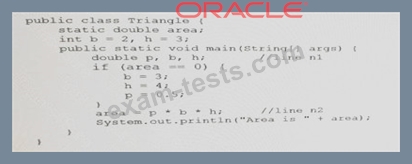Question 16
Given the code fragment:

What is the result?

What is the result?
Question 17
Given the code fragments:
class ThreadRunner implements Runnable {
public void run () { System.out.print ("Runnable") ; }
}
class ThreadCaller implements Callable {
Public String call () throws Exception {return "Callable"; )
}
and
ExecutorService es = Executors.newCachedThreadPool ();
Runnable r1 = new ThreadRunner ();
Callable c1 = new ThreadCaller ();
// line n1
es.shutdown();
Which code fragment can be inserted at line n1to start r1and c1 threads?
Future<String> f1 = (Future<String>) es.submit (r1);
class ThreadRunner implements Runnable {
public void run () { System.out.print ("Runnable") ; }
}
class ThreadCaller implements Callable {
Public String call () throws Exception {return "Callable"; )
}
and
ExecutorService es = Executors.newCachedThreadPool ();
Runnable r1 = new ThreadRunner ();
Callable c1 = new ThreadCaller ();
// line n1
es.shutdown();
Which code fragment can be inserted at line n1to start r1and c1 threads?
Future<String> f1 = (Future<String>) es.submit (r1);
Question 18
Given the code fragment:
List<String> str = Arrays.asList ("my", "pen", "is", "your', "pen");
Predicate<String> test = s -> {
int i = 0;
boolean result = s.contains ("pen");
System.out.print(i++) + ":");
return result;
};
str.stream()
. filter(test)
. findFirst()
. ifPresent(System.out ::print);
What is the result?
List<String> str = Arrays.asList ("my", "pen", "is", "your', "pen");
Predicate<String> test = s -> {
int i = 0;
boolean result = s.contains ("pen");
System.out.print(i++) + ":");
return result;
};
str.stream()
. filter(test)
. findFirst()
. ifPresent(System.out ::print);
What is the result?
Question 19
Given:

What is the result?

What is the result?
Question 20
Given:
class Vehicle {
int vno;
String name;
public Vehicle (int vno, String name) {
this.vno = vno,;
this.name = name;
}
public String toString () {
return vno + ":" + name;
}
}
and this code fragment:
Set<Vehicle> vehicles = new TreeSet <> ();
vehicles.add(new Vehicle (10123, "Ford"));
vehicles.add(new Vehicle (10124, "BMW"));
System.out.println(vehicles);
What is the result?
class Vehicle {
int vno;
String name;
public Vehicle (int vno, String name) {
this.vno = vno,;
this.name = name;
}
public String toString () {
return vno + ":" + name;
}
}
and this code fragment:
Set<Vehicle> vehicles = new TreeSet <> ();
vehicles.add(new Vehicle (10123, "Ford"));
vehicles.add(new Vehicle (10124, "BMW"));
System.out.println(vehicles);
What is the result?

